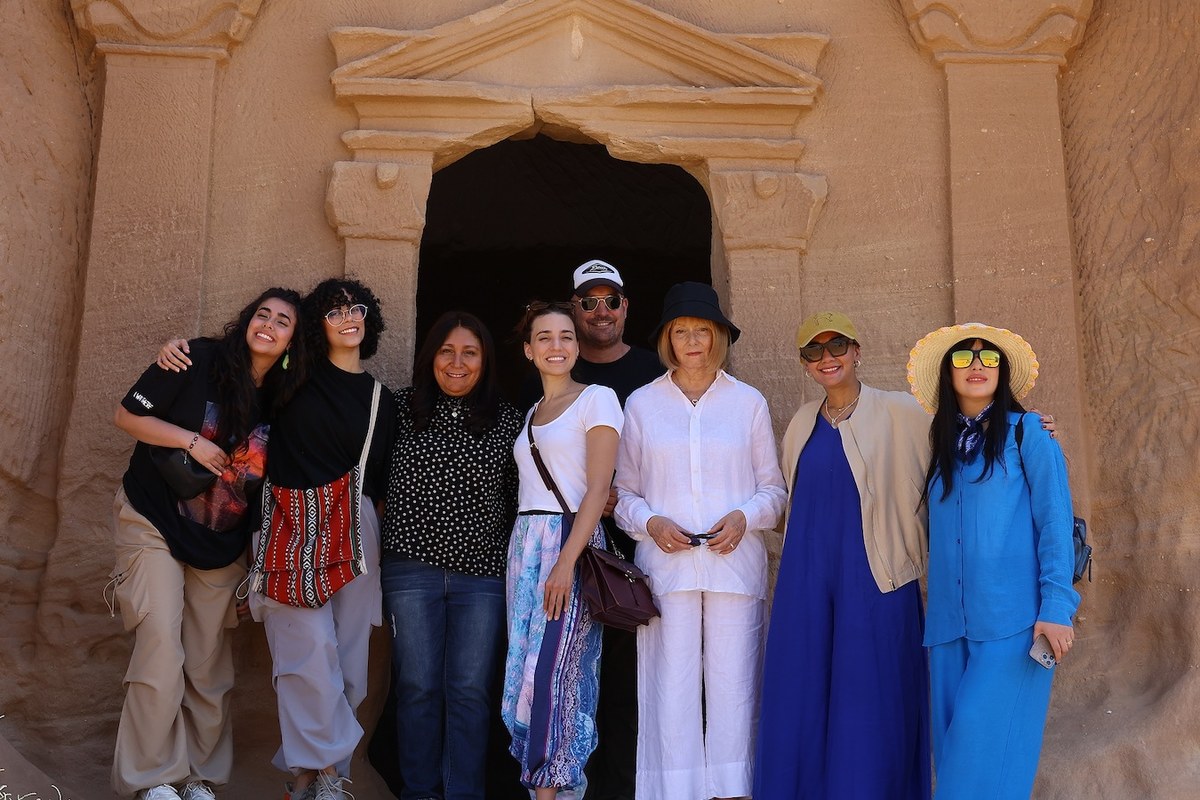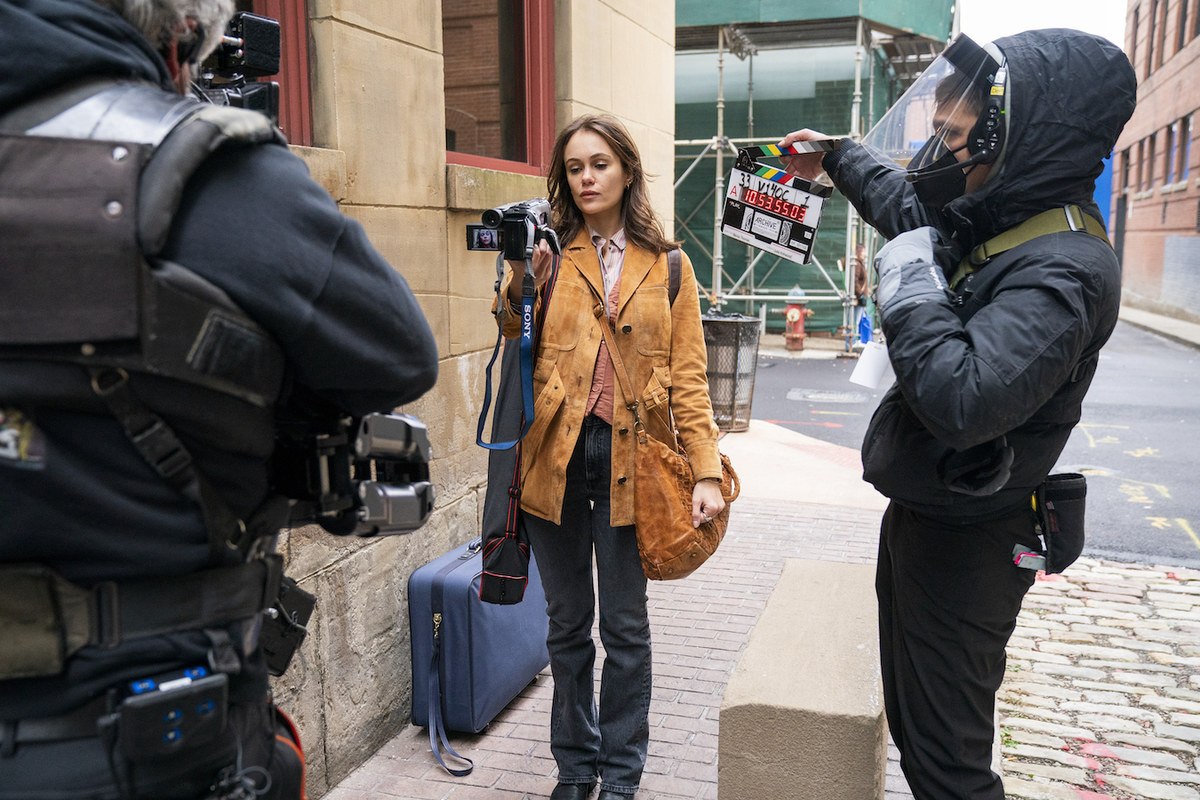DUBAI: Eleven years ago, Saudi director Haifaa Al-Mansour gave the world its first glimpse of what Saudi cinema would become. At a time when movie theaters were still banned, filming permits were nearly impossible to obtain, and no one — let alone a woman — received any encouragement to pursue the artform, she produced her first feature film, “Wadjda.” It took her five years, but she delivered not only the first film shot entirely in the Kingdom, but its first masterpiece.
Today, much has changed — for both Al-Mansour and for Saudi film. Movies from the Kingdom are not only dominating the local box office, they’re making splashy debuts at major film festivals and trending worldwide on Netflix. Al-Mansour, meanwhile, has become one of the most in-demand television directors in Hollywood, helming episodes of hit series including “Archive 81,” “City of Fire,” “Tales of the Walking Dead,” and “Bosch: Legacy.” But even with a packed schedule, her gaze has never left her home country, and the burgeoning talent that follows the path she first trod — maintaining a particular focus on the young women making film and television.

AlUla Creates Mentors Haifaa Al-Mansour (second from left), Jane Moore and James Richardson of Vertigo Films(centre and back) and Roua Al-Madani. (Supplied)
“Saudi Arabia is becoming a very hot market for film. And when things are this active, it’s very easy to push women to the side,” Al-Mansour tells Arab News. “There are so many men who want to take every piece of the pie. We need to be sure, in that landscape, that women have a place to succeed in a field that’s becoming more competitive. We need female Saudi voices in this conversation now more than ever.”
In October, Al-Mansour returned to Saudi Arabia to help ensure just that. Partnering with Film AlUla, the Royal Commission for AlUla’s film agency, Al-Mansour co-led a committee for the inaugural AlUla Creates Film Program, a platform created to nurture Saudi women filmmakers. Together with James Richardson and Jane Moore of Vertigo Films and Roua Almadani of Film AlUla, she selected four rising talents — Hana Alfasi, Maram Taibah, and sisters Raneem and Dana Almohandes — to receive $20,000 short film grants and mentorship.
The three projects chosen from a field of 85 submissions struck Al-Mansour, not just because of how refined their voices already were, but how distinct, showing that what a ‘Saudi film’ even looks like is still being defined.

Saudi actress Dina Shihabi in the cult Netflix horror series 'Archive 81,' directed by Al-Mansour. (Supplied)
“Behind each one of these ideas, you can really see the filmmaker, and that’s what excites me. They’re all personal stories, and the personal connection you feel is what makes them special, and makes them stand out from anything else,” says Al-Mansour.
“These are intimate stories from many different genres, but from a clearly female perspective. But what matters most is that they are distinct. Whether you are a male or female filmmaker, you have to have your own voice, your own subjects that you are passionate about. Why would the world come and listen to you? That perspective needs to come from your life experience, legacy, history, and heritage,” she continues. “You really need to dig inside yourself to find that. And once you find it, it’s still only the beginning.”
Those workshops in AlUla were a transformative experience for Al-Mansour too. Being around those young female filmmakers reignited the passion that drove her to make “Wadjda,” when she refused to take no for an answer all to tell a story that mirrored her own, about a young girl in Riyadh who wants to raise money to buy her own bicycle even though it is frowned upon for women to ride. Undeterred, she pursues her goal by any means necessary, trying everything she can to win a prize she has long dreamed of.

A scene from episode four of 'Tales of the Walking Dead,' directed by Al-Mansour. (Supplied)
“Working with these young women was a wonderful experience, because it reminded me of when I first started, when everything was still thrilling,” Al-Mansour says. “The journey is still ahead of them. I was excited to feed off that energy, because after a while you become jaded in this industry. You want to just get the next project going.”
As far as the film industry has come for women in both the Arab world and globally, there is still a huge disparity in the output from their male counterparts. Even award-winning contemporary filmmakers such as Sofia Coppola, Kelly Reichardt and Jane Campion still struggle to gain support for most projects they helm, especially if it is a truly personal, unique story. Al-Mansour, is ahead of the curve of many of her contemporaries, but still struggles herself.
“The average woman filmmaker produces one film every 10 years in the West, let alone in Saudi Arabia. I’m lucky enough to have directed four films in my career, but a lot don’t get the chance to do that. It’s a struggle. The field has changed, the field is wider, but the opportunities are never as numerous as they may appear. People are conscious to promote women and there’s been huge progress, but there’s still a long way to go,” she says.
The reason Al-Mansour turned to television is not simply because Hollywood has seen how versatile a filmmaker she is and continues to call her for project after project. From a personal perspective, she’s driven to say yes to those calls specifically because she won’t let herself become the type of filmmaker who waits for years pushing for a passion project that may never come to fruition. She wants to be behind a camera whenever she can, so that when those projects finally happen, she’s an even better director.
“When I’m not working, I feel like I get rusty. I have to be able to get myself on set, or I might lose my knack for it. TV gives me the chance to work, to feed the hunger I have to do what I love, and I’m so grateful for it,” says Al-Mansour. “And the beauty of it is that I’m still learning something new every show — whether it’s working with zombies on ‘The Walking Dead’ or in comedies like ‘Florida Man.’ I’m so privileged to be able to work and learn from all these amazing people from a huge talent pool, the breadth of which you can never experience anywhere else.”
The chance to apply what she’s learned to her next film is just around the corner, she reveals to us.
“I have a crime movie set in Saudi Arabia that hopefully we’ll be able to film soon. We’re finalizing the funding from the Ministry of Culture,” she says. “There are exciting things coming soon, and I can’t wait for the world to see them.”












